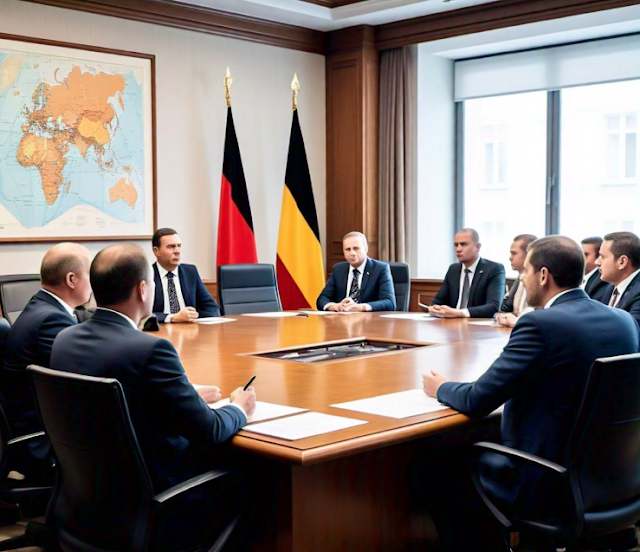
Here is the key points made by German political leaders such
as Economy Minister Robert Habeck regarding climate change, the energy
transition, and the ongoing efforts to meet Germany’s climate targets,
particularly its goal of carbon neutrality by 2045. These issues have been
discussed in recent speeches and interviews. Here’s an overview of the main
themes:
1. Economy Minister Robert Habeck on Climate Change and
Energy Transition
- Germany’s
Green Deal and Carbon Neutrality by 2045: Habeck has been a leading
figure in advocating for Germany’s green transition. He has often spoken
about Germany’s commitment to carbon neutrality by 2045, which aligns with
the EU’s Green Deal. In his speeches, he emphasizes the necessity of rapid
decarbonization and a sustainable energy system as central components of
the nation’s long-term economic policy. - Transition
from Fossil Fuels to Renewables: One of the main aspects of Habeck’s
speeches has been Germany’s strategy to phase out fossil fuels, including
coal, and transition toward renewable energy sources. He has highlighted
the role of wind and solar power in Germany’s energy future, advocating
for expanded renewable energy infrastructure and the reduction of
Germany’s reliance on natural gas, particularly following the energy
shortages exacerbated by Russia’s invasion of Ukraine. - Challenges
of Energy Security: Habeck has addressed the issue of energy security
in Germany, especially after the disruption of gas supplies due to
Russia’s actions in Ukraine. He has emphasized the importance of
diversifying energy sources and increasing storage capacities for renewable
energy. Habeck has made speeches detailing efforts to import more LNG
(liquefied natural gas) from alternative suppliers like the U.S. and Qatar
while also supporting the construction of LNG terminals in Germany. - Green
Technologies and Innovation: Habeck has spoken extensively about the
role of green technologies in the energy transition. He has emphasized the
need for innovation in areas like hydrogen energy, battery storage, and
energy efficiency to make the transition feasible without sacrificing
economic growth. He often highlights Germany’s potential to become a
leader in green technology, both as a way to reduce emissions and as an
opportunity for economic development.
2. Chancellor Olaf Scholz on Climate and Energy Policy
- Commitment
to EU Green Deal and Green Transition: Scholz has underscored
Germany’s alignment with the EU Green Deal and its broader environmental
objectives. In speeches, Scholz often stresses that the transition to
green energy is not just an environmental necessity but an economic
opportunity for Germany. He has consistently reiterated the importance of
supporting the Green Deal with concrete investments in renewable energy
and the decarbonization of key industries. - Phasing
Out Coal: Scholz has spoken about Germany’s commitment to phasing out
coal by 2038, a topic that is closely tied to both Germany’s energy
transition and its climate goals. He has acknowledged the challenges of
managing coal phase-out in regions dependent on coal industries but
stresses that the transition will be supported through investments in
renewable energy and retraining programs for workers in affected sectors. - Energy
Security Post-Ukraine Invasion: Scholz has addressed the energy
security implications of the Russian invasion of Ukraine, calling it a
turning point in Europe’s energy policy. In speeches, he has emphasized
Germany’s efforts to reduce its dependence on Russian energy imports and
diversify its energy sources. This has included investments in renewable
energy infrastructure, LNG imports, and strategic partnerships with other
European countries to ensure a stable energy supply. - EU
Cooperation on Climate Goals: Scholz has discussed Germany’s role in
cooperating with other EU nations to meet the bloc’s climate targets,
reinforcing that addressing climate change is a shared European
responsibility. He has also pointed out the need for a just transition
that ensures fairness for those regions and industries most affected by
the shift away from fossil fuels.
3. Climate Policy in the Context of Economic Growth
- Balancing
Growth with Sustainability: Both Habeck and Scholz have addressed the
challenge of balancing Germany’s economic growth with its climate goals.
In several speeches, Habeck has argued that the green transition is not
only necessary for the environment but can also stimulate economic growth,
create jobs in green technology sectors, and make Germany an innovation
hub in renewable energy. - Just
Transition: The concept of a “just transition” is frequently
mentioned by both leaders. Habeck, in particular, has highlighted the need
for social and economic fairness in the transition to a carbon-neutral
economy. This includes ensuring that vulnerable regions, especially those
dependent on coal, are supported with retraining programs and investments
to diversify their economies.
Key Themes in Interviews and Speeches:
- Decarbonizing
the Economy: Both Habeck and Scholz consistently emphasize the
importance of decarbonizing various sectors of the economy, including
industry, transportation, and buildings. They stress that this is critical
for achieving Germany’s 2045 carbon neutrality target. - Germany’s
Role in Global Climate Leadership: Scholz and Habeck have also
addressed Germany’s role in global climate leadership, emphasizing the
country’s responsibility to set an example in tackling climate change and
supporting international climate agreements such as the Paris Agreement. - Energy
Security and Diversification: In light of the energy crisis caused by
the war in Ukraine, both leaders have highlighted Germany’s need to
diversify its energy sources. They discuss strategies like building
infrastructure for renewable energy, increasing hydrogen production, and
fostering greater European energy cooperation. - Investments
in Green Technologies: Both ministers stress the importance of
investing in new green technologies, such as hydrogen fuel, carbon
capture, and storage, as part of the energy transition. They argue that
these innovations are essential for Germany to maintain its competitive edge
while achieving its climate and energy goals.
A Word From Politicalvista
In conclusion, Germany’s political leaders have consistently
addressed the complexities of transitioning to renewable energy, balancing
climate change objectives with economic growth, and ensuring energy security in
the wake of geopolitical events like Russia’s invasion of Ukraine.
Through
speeches and interviews, Robert Habeck, Chancellor Olaf Scholz, and other
political figures have made it clear that the energy transition is central to
Germany’s future, with green technologies, international cooperation, and a
focus on fairness for affected regions being key priorities.

Be the first to comment